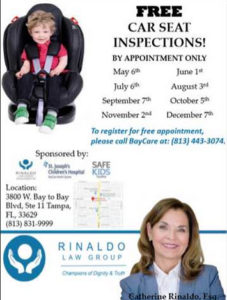Car Seat Safety Matters

Because of the lovely weather in our state, many families are out and about every chance they get. While parents are diligent in making certain their children are as safe as possible, one major instance where accidents can happen is in the car. Child car seat safety rules and laws can confuse even the most seasoned parent, and it is generally a good idea to refresh oneself every so often on how best to protect your children in these matters. A defective car seat or an improperly installed one can lead to tragedy.
State Laws For Car Seat Safety
Florida is actually unusual in that it is one of the few states that requires booster seats for children under age 6 if they are not either 4 ft 9 inches tall, at least 40 lbs, or both. Previously only children aged 3 and under required car seats or booster seats, but the state saw an uptick in child injuries and thus made modifications to the law in 2015. Failure to comply with the law will result in a $60 fine and three points on the parent’s driver’s license, which is significant, though there are exceptions for drivers who are (1) unpaid and not a member of the child’s immediate family, and (2) transporting a child for medical treatment in the event of an emergency.
In terms of whether a car seat should be front or rear facing, the law is silent, but the important factor is whether or not the car seat adequately supports the child. This applies to booster seats for older children as well – if the child is not boosted up to the height where the seatbelt hits them at the right point on the body, any injuries they may sustain may be worse than they would otherwise, because that protection is essentially lacking. This can also have repercussions in negligence actions – if you are in an accident and your child’s safety seat is not secured appropriately, a judge or jury may decide that you were contributorily negligent and reduce your recovery.
Verify The Seat Is Working Properly
In addition to knowing the relevant law, the other thing a parent can do to ensure maximum car seat safety is make sure the seat is working properly – that is, that it buckles in properly and its restraints are in good shape. If a car seat malfunctions during an accident, it can cause real harm to the child in it, as multiple outcomes are possible – for example, being ejected from the vehicle, sustaining whiplash due to stuck restraints causing rapid motion of the skull or neck, or having poor padding contribute to bruises and muscle issues.
Be advised that Florida product liability cases, in case of malfunction, can be difficult but not impossible to win. A plaintiff can bring a product liability claim alleging either a manufacturing defect (a product came off the line working incorrectly), a design defect (a product which is dangerous as intended), or failure to warn, which is fairly self-explanatory. While these types of cases can get quite complex, the crux of the matter is that if you are able to show that you were injured due to a product not performing in its expected manner, or that you ought to have been warned by the manufacturer that there was the potential for danger, you have a solid possibility of recovery.
Seek Experienced Legal Help Today
Most parents would do anything to ensure their children’s safety, but even with such hard work, accidents happen. If your child has been injured and their car seat is at least partially to blame, you may be able to seek compensation for the medical bills and for the pain and suffering. The Tampa personal injury lawyers at Rinaldo Law Group are knowledgeable and compassionate, and will work hard to ensure that the fairest possible outcome is reached. Call our offices today to schedule an appointment.

Resources:
orlandosentinel.com/news/os-new-laws-take-effect-20141229-story.html#
leg.state.fl.us/statutes/index.cfm?App_mode=Display_Statute&URL=0700-0799/0768/Sections/0768.81.html












